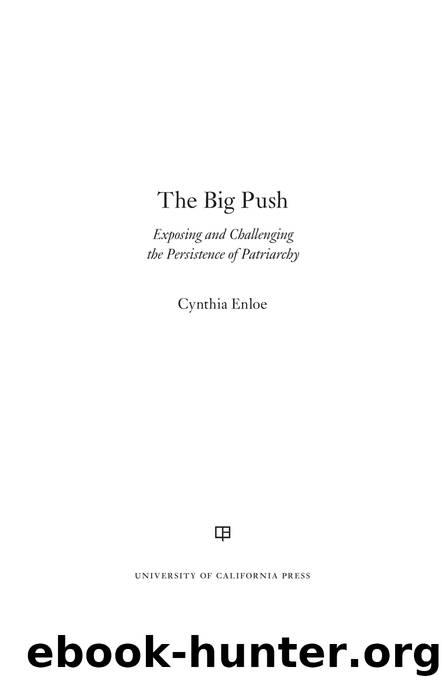The Big Push by Enloe Cynthia;

Author:Enloe, Cynthia;
Language: eng
Format: epub
Publisher: University of California Press
On what terms shall we join that procession? Above all, where is it leading us, the procession of educated men? . . . But, you will object, you have no time to think; you have your battles to fight, your rent to pay, your bazaars to organize. That excuse shall not serve you, madam. As you know from your own experience, and there are facts that prove it, the daughters of educated men have always done their thinking from hand to mouth; not under green lamps at study tables in the cloisters of secluded colleges. They have thought while they stirred the pot, while they rocked the cradle. . . . Let us never cease from thinking—what is this ‘civilisation’ in which we find ourselves? What are these ceremonies and why should we take part in them? What are these professions and why should we make money out of them? Where in short is it leading us, the procession of the sons of educated men?5
If Three Guineas is simultaneously a post-war and pre-war work, Simone de Beauvoir’s classic work of political theory, The Second Sex, first published in France in 1949, can be read as a postwar work of political theory. Beauvoir’s archaeological excavation of the social construction of womanhood was informed by her living through World War II and the Nazi occupation of Paris. Her wartime experiences prompted Beauvoir to explore political power operating in the intimate personal realm and thus to examine women’s societal relegation to positions of passivity, weakness, and irresponsibility.
Attentively noticing—taking seriously—the international implications of the apparently trivial minutiae of marital politics, therefore, is not new. Today’s explorations are rooted in feminist political theorizing stretching back at least to the 1790s. What is new is the fresh, up-close investigations by feminist researchers into specific militarized marriages. Specifically, these scholars are asking what sort of political power is needed, in specific times and societal settings, to create—and sustain—militarized marriages. They follow up this question with its corollaries: who has what stakes in maintaining each kind of militarized marriage? And: what are the complex, often silent, frequently ambivalent responses of racially, nationally, and class-diverse civilian women to living their lives within such militarized marriages?6 The investigators have developed an intellectual appetite for “the clumsy banalities” that help constitute international politics.7
In most militarized marriages, it is the husband who is playing the most explicitly militarized role—not only as a rank-and-file soldier or uniformed officer, but also as a nuclear weapons scientist, a civilian defense strategist, a defense industry engineer, a defense-budget-promoting legislator, a national security intelligence operator, a private security company contractor, a non-state militia fighter, or a rebel militia fund-raiser. Most of these men are (heterosexually) married, or hope to be. Their manly status—in their own eyes and in the estimation of their colleagues—depends not just on having sexual relations with a woman, but on having a wife, a loyal wife. Her wifely loyalty will become untrustworthy if she does not herself take on the attributes of feminized militarization.
Download
This site does not store any files on its server. We only index and link to content provided by other sites. Please contact the content providers to delete copyright contents if any and email us, we'll remove relevant links or contents immediately.
| Anthropology | Archaeology |
| Philosophy | Politics & Government |
| Social Sciences | Sociology |
| Women's Studies |
On the Front Line with the Women Who Fight Back by Stacey Dooley(4319)
The Lonely City by Olivia Laing(4134)
The Rules Do Not Apply by Ariel Levy(3920)
Bluets by Maggie Nelson(3733)
The Confidence Code by Katty Kay(3580)
Three Women by Lisa Taddeo(2927)
A Woman Makes a Plan by Maye Musk(2845)
Inferior by Angela Saini(2843)
Pledged by Alexandra Robbins(2798)
Not a Diet Book by James Smith(2746)
Confessions of a Video Vixen by Karrine Steffans(2686)
Wild Words from Wild Women by Stephens Autumn(2603)
Nice Girls Don't Get the Corner Office by Lois P. Frankel(2602)
Brave by Rose McGowan(2512)
The Girl in the Spider's Web: A Lisbeth Salander novel, continuing Stieg Larsson's Millennium Series by Lagercrantz David(2387)
The Clitoral Truth: The Secret World at Your Fingertips by Rebecca Chalker(2252)
Why I Am Not a Feminist by Jessa Crispin(2250)
Women & Power by Mary Beard(2231)
Women on Top by Nancy Friday(2134)
